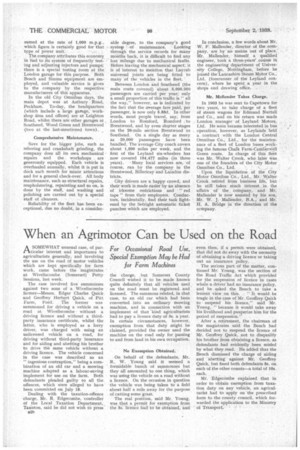When an Agrimotor Can be Used on the Road
Page 38

If you've noticed an error in this article please click here to report it so we can fix it.
For Occasional Road Use, Special Exemption May be Had for Farm Machines
ASOMEWHAT unusual case, of particular interest and importance to agriculturists generally, and involving the use on the road of motor vehicles which are kept specifically for farm work, came before the magistrates at Wiveliscornbe (Somerset) Petty Sessions, last week.
The case involved five summonses against two sons of a Wiveliscombe farmer—Messrs. Edgar Charles Quick and Geoffrey Herbert Quick, of Pitt Farm, Ford. The former was summoned for driving a vehicle on a road at Wiveliscombe without a driving licence and without a thirdparty insurance certificate, whilst the latter, who is employed as a lorry driver, was charged with using an unlicensed vehicle on a road, for driving without third-party insurance and for aiding and abetting his brother to drive the same vehicle without a driving licence. The vehicle concerned in the case was described as an "ingenious contraption," being a combination of an old car and a mowing machine adapted as a labour-saving implement for use on the farm. Both defendants pleaded guilty to all the offences, which were alleged to have been committed on July 18.
Dealing with the taxation-offence charge, Mr. R. Eigecombe, controller of the Local Taxation Department, , Taunton, said he did not wish to press si2a. the charge, but Somerset County Council wished it to be made known quite definitely that all vehicles used on the road must be registered and licensed. The summons related, in that case, to an old car which had been converted into an ordinary snowing machine, and in connection with an implement of that 'kind agriculturists had to pay a licence duty of 5s. a year. In certain circumstances, however, exemption from that duty might be claimed, provided the owner used the machine on the road only for passing to and from land in his own occupation.
No exemption Obtained.
On behalf of the defendants, Mr. R. W. Young said it seemed a formidable hunch of summonses but they all amounted to one thing, which was using the vehicle on a road without a licence. On the occasion in question the vehicle was being taken to a field about half a mile away for the purpose of cutting some grass.
The real position, said Mr. Young, was that a permit for exemption from the 5s. licence bad to be obtained, and
even then, if a permit were obtained, that did not do away with the necessity of obtaining a driving licence or taking out an insurance policy.
The serious part of the matter, continued Mr. Young, was the section of the Road Traffic Act which provided for the suspension of licence in cases where a driver had no insurance policy, and he asked the Bench to take a
lenient view on this. "It would be tragic in the case of Mr. Geoffrey Quick to suspend his licence," said Mr. Young, " because it would take away his livelihood and pauperize him for the period of suspension."
After a retirement, the chairman of the magistrates said the Bench had decided not to suspend the licence of Mr. Geoffrey Quick, not to disqualify his brother from obtaining a licence, as defendants had evidently been misled by what they read. He added that the Bench dismissed the charge of aiding and abetting against Mr. Geoffrey Quick, but fined both defendants 5s. on each of the other counts—a total of 10s. each.
Mr. Edgecombe explained that in order to obtain exemption from taxation duty on any vehicle, an agriculturist had to apply on the prescribed form to the county council, which forwarded the application to the Ministry of Transport.




















































































